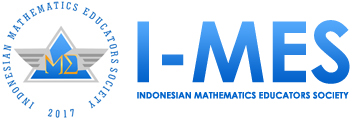Islamic Values-Based Mathematics Learning for Secondary Schools in Islamic Boarding Schools
Abstract
Islamic values have become a robust culture in the Islamic Boarding Schools (Pesantren), but very few mathematics teachers still use them in learning mathematics. This study aimed to explore learning mathematics based on Islamic values in junior high schools in Islamic boarding schools. This qualitative research uses a case study method at the Zamzam Islamic Boarding School, Banyumas Regency, Central Java, Indonesia. Two classes (class VII and class VIII) were selected as research subjects with different teachers. Researchers used in-depth interviews with teachers and students, observations, and learning documents to collect data. Data were analyzed interactively and inductively, continued until it was finished to be saturated. Activities in data analysis include data collection, data reduction, data display, and data conclusion. The results showed that mathematics learning in Islamic boarding schools was integrated with Islamic values in learning tools (syllabus, lesson plans, student worksheets) and the implementation of learning, such as materials, methods, media, and teacher leadership behavior in education.
Keywords
Full Text:
PDFReferences
Amaliah, I., Julia, A., & Riani, W. (2013). Pengaruh dari Nilai-Nilai Islam terhadap Kinerja Kerja. MIMBAR: Jurnal Sosial dan Pembangunan, 29(2), 165-174.
Creswell, J. W. (2009). Research Design Qualitative, Quantitative, and Mixed Methods Approaches. SAGE Publications (p. 260). https://doi.org/10.2307/1523157
Deeson, E. (1974). Ideas and Opinions. Physics Bulletin, 25(4), 149–150. https://doi.org/10.1088/0031-9112/25/4/026
Fahmy, R., Bachtiar, N., & Rahim, R. (2017). Measuring and analyzing students’ personal characters in implementing character education. Advanced Science Letters, 23(9), 8917–8923. https://doi.org/10.1166/asl.2017.9995
Ghufron, M. N. (2017). Spiritualitas Dan Kesuksesan Belajar: Studi Meta Analisis. Edukasia: Jurnal Penelitian Pendidikan Islam, 11(2), 355-376. https://doi.org/10.21043/edukasia.v11i2.1774
Hartono, H. (2016). Pendidikan Integratif. Purwokerto: Kaldera Institute.
Hudha, A. M., Ekowati, D. W., & Husamah, H. (2014). Character education model in mathematics and natural sciences learning at Muhammadiyah junior high school. International Journal of Education, Learning & Development, 2(4), 33-47.
Idri, M. A., & Baru, R. (2017). The Principles of Islamic Economics and their Implementation in Indonesia. International Journal of Academic Research in Business and Social Sciences, 7(4), 2222-6990. https://doi.org/10.6007/ijarbss/v7-i4/2809
Irawan, D. (2016). Islam Dan Peace Building. Religi Jurnal Studi Agama-Agama, 10(2), 158-171. https://doi.org/10.14421/rejusta.2014.1002-02
Islam, A. (2011). The contribution of Muslims to science during the Middle Abbasid Period (750-945). Revelation and science, 1(01), 39-56.
Jaedun, Purwaningsih, Novita & Wiranata (2012). Implementation of integrated character education in learning activities at Vocational Schools majoring in Building in Yogyakarta Special Region. Journal of Technology and Vocational Education, 21(1), 74-82.
Jazuli, A. (2012). Overview of mathematical thinking skills, morals and mathematics learning achievement of junior high school students in learning based on Islamic culture. Dissertation. Indonesian Education University (UPI). Bandung, p. 231
Lubis, A. H. (2016). Faith education and the formation of Muslim personalities. Darul 'Ilmi Journal, 4(1), 56-66.
Matlin, M. W. (2012). Cognition. Eight Edition. Hoboken, New Jersy: John Wiley & Sons, Inc.
Miller, J. P., Karsten, S., Denton, D., Orr, D., & Kates, I. C. (2005). Holistic learning and spirituality in education: Breaking new ground. Holistic Learning and Spirituality in Education: Breaking New Ground (pp. 1–250). State University of New York Press.
Mufid, F. (2014). Islamic Sciences Integration. QIJIS (Qudus International Journal of Islamic Studies), 2(2), 144–160.
Mupa, P., & Chinooneka, T. I. (2015). Factors contributing to ineffective teaching and learning in primary schools: Why are schools in decadence? Journal of Education and Practice, 6(19), 125–132.
Rahmi, F., Nasri, B., Rida, R. (2017). Measuring and Analyzing Students’ Personal Characters in Implementing Character Education. Advanced Science Letters, 23(9), 1-15. https://doi.org/10.1166/asl.2017.9995
Rosmini, R., Syamsidar, S., & Haniah, H. (2017). Geliat Keberagamaan Moderat Komunitas Muslim Tionghoa (Kontribusi Pengkajian Islam Intensif dalam Keberagamaan Moderat Komunitas Muslim Tionghoa Kota Makassar). Al-Ulum, 16(1), 36-55. https://doi.org/10.30603/au.v16i1.26
Rusdiana, A. (2014). Integrasi Pendidikan Agama Islam Dengan Sains dan Teknologi. Istek, 8(2), 123–143.
Salafudin, S. (2015). Pembelajaran Matematika yang Bermuatan Nilai Islam. Jurnal Penelitian, 12(2), 223-243. https://doi.org/10.28918/jupe.v12i2.651
Sari, N. (2013). The Importance of Teaching Moral values to The Students. Journal of English and Education, 1(1), 154–162.
Soedjadi, R. (2000). Kiat pendidikan matematika di Indonesia: konstatasi keadaan masa kini menuju harapan masa depan. Direktorat Jenderal Pendidikan Tinggi, Departemen Pendidikan Nasional.
Vygotsky, L. S. (2019). Interaction between Learning and Development. In Mind in Society (pp. 79–91). Harvard University Press. https://doi.org/10.2307/j.ctvjf9vz4.11
Zuhriy, M. S. (2011). Budaya pesantren dan pendidikan karakter pada pondok pesantren salaf. Walisongo: Jurnal Penelitian Sosial Keagamaan, 19(2), 287-310. https://doi.org/10.21580/ws.2011.19.2.159
Refbacks
- There are currently no refbacks.

This work is licensed under a Creative Commons Attribution-NonCommercial-ShareAlike 4.0 International License.
Indonesian Journal of Ethnomathematics
Indonesian Mathematics Educators Society
Jl. Terusan Jend. Sudirman, Kec. Cimahi Tengah, Kota Cimahi, Jawa Barat 40521
E-mail: [email protected]
ISSN: 2775-8001


